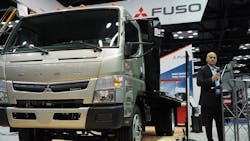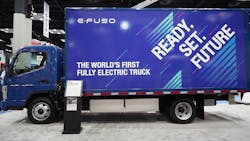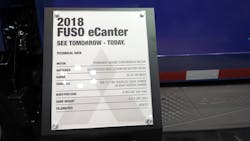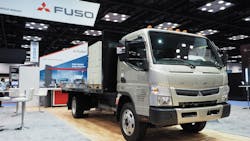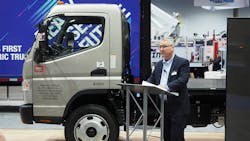INDIANAPOLIS. At the NTEA Work Truck Show in 2016, diesel and gas prices had dropped dramatically and interest in alternative fuels in trucking seemed to have followed suit. An oddball among truck and product launches at the show that year was Mitsubishi Fuso's battery-electric prototype of its Canter cabover truck, and when the OEM called it "the future" for such vehicles it seemed a stretch at best — or maybe just out of touch with reality.
Thirty-six months later, nearly every existing truck manufacturer and a number of new players besides are working on, testing and investing in their own electric trucks spanning Classes 1-8. Meanwhile, Fuso's Class 4 battery electric eCanter went into series production for the U.S. market last year, the company expects to reach full commercial production in 2019, and work is well underway on a model update.
"This is the fourth time that Fuso is showing an e-propulsion truck at the NTEA," said Justin Palmer, president and CEO of Mitsubishi-Fuso Truck, at a press event Wednesday at Work Truck Show 2019. "Three years ago, when we came with our E-Cell — the first version of the electric truck — everyone was shocked. Everyone was joking. And everyone was asking, 'What is Fuso doing?'"
"Today, go around the floor — everyone's trying to do the same," he continued. "Everyone is trying to do what we started doing some time ago."
It's no overstatement. As alternative fuels to diesel in trucking go, the greatest interest and momentum is clearly now in electric power and propulsion. Electric trucks are not only the biggest crowd-draw and item of interest among fleets and trucking companies — for reasons ranging from business to environmental benefits — they've transitioned from essentially a shiny show trinket to a dominant theme for a truck development race every OEM wants to win.
For now, Fuso's eCanter is designed for short-distance trucking jobs such as urban distribution and pickup-and-delivery operations. Bill Lyons, Fuso's vice president of sales operations, acknowledged that the current model works well but has its limitations, and "Version 2.0" — for which he wouldn't give a release date — will bring improvements.
The eCanter "is really designed for the urban market, so it does very well there. It's not an over-the-road truck," Lyons said. "The way [customers] run their operations, from the charging to route optimization, they're having great success.
"It's very quiet, and it actually has a lot of torque off the start," he continued. "Customers give us great feedback on this truck, and we'll continue to learn. Obviously, down the road, we see more opportunities for the technology to change so the range can get better and things like that. That's what we're learning today."
Bigger gas-powered cabover
Fuso made another propulsion prediction for where the market is going in its segment of medium-duty Class 3-5 cabover trucks as the company rolled out a heavier-class gasoline-powered cabover, the Class 5 FE180 Gas.
It features a General Motors 6.0L V8 rated at 297 hp and 361 lbs.-ft. of torque paired with an Allison 1000 Series automatic transmission. Like the lighter Class 4 FE Gas cabovers Fuso debuted last year at the Work Truck Show, the FE180 Gas will come with a number of standard features and benefits including electro-coated frame rails for added durability, a 40-gallon in-rail fuel tank, 19.5-in. tires, keyless entry, and a year's subscription to Verizon Connect telematics services.
Fuso said in a release that it "developed this new truck with the understanding that gasoline-powered trucks are shifting the industry norm from diesel to the new standard of gas."
"Why are we doing it? Because we identified that the customers want gasoline and we see our competition — we see other players — going in the same direction," Palmer contended. "And I have to say that I feel very comfortable as an underdog in many ways to lead the market, both in the gasoline segment and definitely in the electric segment, and proud of it.
"I think it shows that we're going in the right direction," he said.
The FE180 Gas is expected to arrive at dealerships late this year as a 2020 model and will be built at Daimler Truck's Freightliner Custom Chassis Corp. plant in Gaffney, SC.
Lyons said Fuso is seeing customers such as landscapers, plumbers, electricians and other tradesmen choose its gasoline-powered trucks over diesel models, noting the complexity and operating costs of diesel trucks are helping drive these buyers away. For instance, gasoline engines don't have the same complex emission-control systems diesels do or require diesel exhaust fluid.
"Those kinds of things make it difficult for a regular user," Lyons said. Fuso is emphasizing that the FE180 Gas and its other gasoline-powered models can simplify things; here at the show, one of the tag lines the company is using for the FE180 Gas is "Fuel it like a car, work it like a truck."
"You start reducing the complication and the price of fuel — gasoline is cheaper than diesel — and in the right operations, [a gasoline-powered truck] actually has more uptime," Lyons contended. "The truck is on the road a lot more, and that's what the customer is telling us."
About the Author
Aaron Marsh
Aaron Marsh is a former senior editor of FleetOwner, who wrote for the publication from 2015 to 2019.
